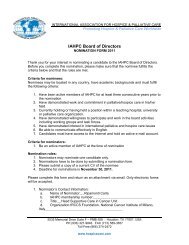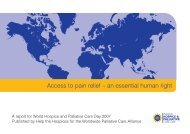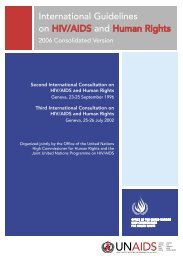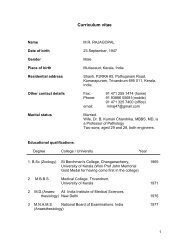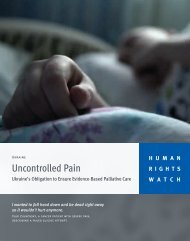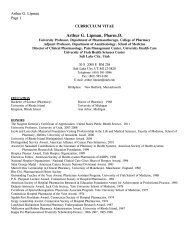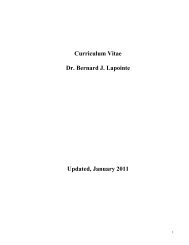INTERIGHTS Bulletin
INTERIGHTS Bulletin
INTERIGHTS Bulletin
Create successful ePaper yourself
Turn your PDF publications into a flip-book with our unique Google optimized e-Paper software.
<strong>INTERIGHTS</strong> <strong>Bulletin</strong><br />
Volume 16 Number 4 2011<br />
169<br />
in international human rights law on<br />
women’s economic, social and cultural<br />
rights. Further, CEDAW’s inclusion of<br />
factors affecting the victim’s access to<br />
health services, such as poverty and<br />
race, was an important step in further<br />
developing an intersectional<br />
understanding of women’s economic,<br />
social and cultural rights. 52 The case is<br />
a significant example of how litigation<br />
can be used as an effective tool to<br />
encourage states to respond to<br />
maternal mortality issues.<br />
Degrading and ill-treatment in mental<br />
health institutions<br />
Mental health patients often live in<br />
deplorable conditions. The World<br />
Health Organization (WHO) has<br />
reported that violations within<br />
psychiatric institutions include people<br />
restrained by rusting metal shackles,<br />
kept in caged beds, living in filthy<br />
conditions, kept in seclusion for<br />
lengthy periods and lacking clothes,<br />
clean water, food, heating, proper<br />
bedding and hygiene facilities. Patients<br />
are often isolated from society and held<br />
in institutions far away from their<br />
loved ones. Patients experience<br />
inappropriate forced admission or<br />
treatment and are detained against<br />
their will for weeks, months or years. 53<br />
These situations are contrary to states’<br />
regional and international human<br />
rights obligations. 54 The WHO<br />
recommends that states set up<br />
monitoring bodies to ensure that<br />
human rights are respected in mental<br />
institutions and that mental health<br />
care is available at the community<br />
level. 55<br />
In Purohit & Moore v the Gambia, the<br />
African Commission reiterated that<br />
mental health patients should be<br />
accorded special treatment to enable<br />
them to attain and sustain their<br />
optimum level of independence and<br />
performance. This would be consistent<br />
with Article 18(4) ACHPR and the<br />
standards outlined in the UN<br />
Principles for the Protection of<br />
Persons with Mental Illness and<br />
Improvement of Mental Health<br />
Care. 56<br />
Linking the violations to key human<br />
rights law principles<br />
Appropriate responses to the above<br />
violations require an understanding of<br />
how they engage key human rights<br />
principles.<br />
The right to life<br />
The right to life is enshrined in Article<br />
6 of the ICCPR and in Article 4 of the<br />
ACHPR. Under both international and<br />
comparative case law, the right to life is<br />
seen as not only imposing a negative<br />
obligation upon states to not arbitrarily<br />
deprive one’s life, but also corresponds<br />
to a positive obligation to take steps in<br />
order to guarantee life, which includes<br />
measures to reduce high rates of<br />
preventable maternal mortality. Several<br />
national and international bodies have<br />
also interpreted the right to life or even<br />
the right to not be subjected to cruel,<br />
inhuman or degrading treatment as<br />
including the right to health, 57<br />
particularly the right to primary health<br />
care and emergency treatments.<br />
The obligation to respect, protect and<br />
fulfil the right to health<br />
States are required to respect, protect<br />
and fulfil the right to health. 58 The<br />
obligation to respect requires states to,<br />
inter alia, refrain from denying or<br />
limiting, directly or indirectly, equal<br />
access to the right to health for all<br />
persons. The obligation to protect not<br />
only entails protecting indi viduals and<br />
communities from violations, but also<br />
requires the investigation and<br />
prosecution of perpetrators and the<br />
provision of legal and other remedies<br />
to victims. 59 It is an obligation of<br />
immediate effect and thus readily<br />
justiciable, though if the positive steps<br />
required were resource-intensive the<br />
obligation would be quali fied by the<br />
maximum available resources of the<br />
state. 60 The obligation to fulfil<br />
requires states to adopt appropriate<br />
legislative, administrative, budgetary,<br />
judicial, promotional and other<br />
measures to fully realise the right to<br />
health. 61<br />
Freedom from torture and cruel,<br />
inhuman or degrading treatment<br />
The right to be free from torture and<br />
cruel, inhuman or degrading<br />
treatment is not only specifically<br />
protected by several international and<br />
regional conventions but is now widely<br />
acknowledged as part of customary<br />
international law. It is integrally linked<br />
to the right to health. 62 The absolute<br />
prohibition of torture entails certain<br />
positive obligations that are absolute in<br />
nature, such as the duty to provide<br />
victims with an effective remedy and<br />
full and adequate reparation. The<br />
importance of access to a court for<br />
torture is reflected across international<br />
norms and practice. 63<br />
How should states respond to these<br />
kinds of violations<br />
State parties have immediate<br />
obligations to take steps to respect<br />
their international obligations. 64 They<br />
are obliged to take legislative measures<br />
and allocate sufficient resources within<br />
national budgets to deal with<br />
weaknesses in their health structures.<br />
Where states allege resource<br />
constraints to deal with violations in<br />
healthcare settings, they have the<br />
burden of justifying that every effort<br />
has nevertheless been made to use all<br />
available resources. 65 Similarly, when<br />
a state claims that it has failed to<br />
realise minimum essential levels of<br />
economic, social and cultural rights, it<br />
must be able to show that it has<br />
allocated all available resources<br />
towards the realisation of these<br />
rights. 66<br />
National plans should be based on<br />
human rights principles and states<br />
should consider adopting a framework<br />
law to operationalise their strategies, 67<br />
which should identify appropriate<br />
right-to-health indicators and<br />
benchmarks. 68<br />
In terms of healthcare settings, states<br />
should realise the minimum core<br />
obligation to ensure that no significant<br />
number of individuals is deprived of<br />
the essential elements of a particular<br />
right. 69 The state must ensure access<br />
to health facilities, goods and services<br />
on a non-discriminatory basis,<br />
especially for vulnerable and<br />
marginalised groups, and the<br />
provision of essential drugs. States<br />
should also ensure an equitable



